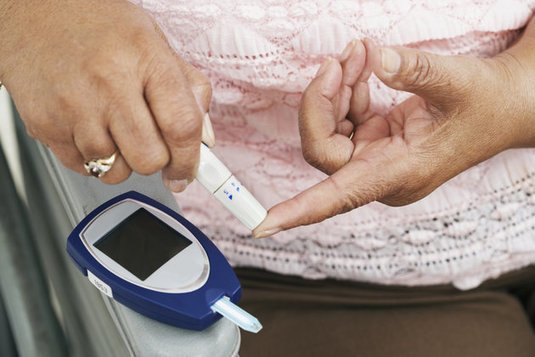The Number Of Adults With Diabetes Has Quadrupled To 422 Million

LONDON (Reuters) – The number of adults with diabetes has quadrupled worldwide in under four decades to 422 million, and the condition is fast becoming a major problem in poorer countries, a World Health Organization study showed on Wednesday. In one of the largest studies to date of diabetes trends, the researchers said ageing populations and rising levels of obesity across the world mean diabetes is becoming “a defining issue for global public health”.
Diabetes: can you really eat to beat it?

Converts to the bestselling blood sugar diet say you can. When one type 2 diabetic tried it, he reversed his condition. Four years on, is he still cured?
Diet Sensor : The Tool For Nutrition Therapy In Diabetes

Although type 2 diabetes is preventable, its prevalence and incidence are rapidly increasing in the United States and worldwide. Currently, more than 5.4% of adults worldwide have a diagnosis of diabetes, and an estimated 300 million will have diabetes by 2025. With no cure available for diabetes, primary prevention through diet and exercise is important. DietSensor helps you to maintain this nutritional therapy on daily basis. Let’s discover how.
How safe is fructose for persons with or without diabetes?

In this issue of the journal, Livesey and Taylor (1) present a meta-analysis of clinical trials evaluating the effects of fructose intake. They concluded that fructose is safe at doses of <90 g/d and that it may have the added benefit of lowering concentrations of glycated hemoglobin (HbA1c). This meta-analysis is difficult to interpret, because it involves randomized and nonrandomized studies of differing designs, mixed populations (diabetic and non diabetic lean and obese), different control diets (including some sucrose-based diets that contained fructose), different study durations, and limited endpoints; it also represents an analysis by an industry-sponsored group of a highly selected list of studies
DietSensor : Hope for Reversing Type 2 Diabetes

Many experts believe Type 2 diabetes is an incurable disease that gets worse with time. But new research raises the tantalizing possibility that drastic changes in diet may reverse the disease in some people.
Ultra-processed foods and added sugars in the US diet: evidence from a nationally representative cross-sectional study

Ultra-processed foods comprised 57.9% of energy intake, and contributed 89.7% of the energy intake from added sugars. The content of added sugars in ultra-processed foods (21.1% of calories) was eightfold higher than in processed foods (2.4%) and fivefold higher than in unprocessed or minimally processed foods and processed culinary ingredients grouped together (3.7%). Both in unadjusted and adjusted models, each increase of 5 percentage points in proportional energy intake from ultra-processed foods increased the proportional energy intake from added sugars by 1 percentage point.
Study finds eating pears regularly may improve blood pressure, heart function | Latest News & Updates at Daily News & Analysis

Eating fresh pears may improve blood pressure and vascular function in middle-aged men and women who are at risk of developing cardiovascular diseases and type 2 diabetes, according to a new study. “These initial results are very promising,” said lead author Sarah A Johnson, who conducted the research while at Florida State University. “With metabolic syndrome being of such high prevalence in the US, we feel it is important to explore the potential for functional foods such as pears to improve cardiovascular risk factors such as blood pressure in affected middle-aged adults,” Johson said, who is now at from the Colorado State University.
NHS England » Prevention is key to the fight against heart disease – Dr Matt Kearney

The newly appointed National Clinical Director for Cardiovascular Disease Prevention looks at the challenges ahead: There is now growing acceptance across the NHS that we have to get serious about prevention. Much of this, of course, is driven by the epidemic of obesity, poor diet, inactivity and other risk factors that come with the 21st century lifestyle. It is estimated that around two thirds of premature deaths – that is deaths before the age of 75 – could be prevented by tackling the major risk factors. And one in four premature deaths is caused by cardiovascular disease (CVD), especially heart attacks and strokes.
Shared risk factors lead to diabetes, heart disease and cancer, says major AACR symposium

In a major symposium at the American Association for Cancer Research (AACR) Annual Meeting 2015, University of Colorado Cancer Center investigator Tim Byers, MD, MPH, describes research showing the link between cancer, diabetes and cardiovascular disease. “Understanding the similarities and differences in how these risk factors create cancer, diabetes and cardiovascular disease could aid the ways we prevent all three diseases,” Byers says.
What Parents Should Know About Type 1 Diabetes

A diagnosis of type 1 diabetes is life-changing for a child–and his or her parents. “That means that affected children and their parents must be vigilant about monitoring their condition–and because there is no cure, this type of maintenance will last a lifetime,” says Maureen Villasenor, MD, a board-certified pediatrician at St. Joseph Heritage Medical Group. « Healthy diet and exercise, blood sugar monitoring and insulin treatments are all part of that. »



